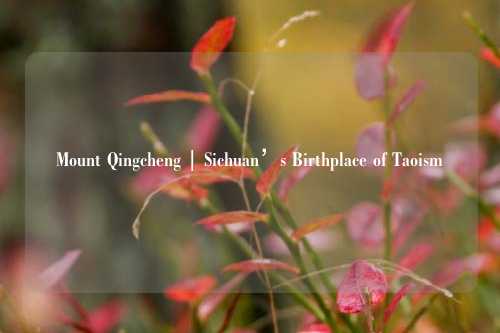Mount Qingcheng | Sichuan’s Birthplace of Taoism
The Spiritual Significance of Mount Qingcheng
Mount Qingcheng, located in the Sichuan Province of China, is widely regarded as the birthplace of Taoism and a revered center for Taoist culture. Known for its serene environment, lush greenery, and profound spiritual importance, this mountain offers more than just natural beauty; it serves as a living testament to the history and philosophy of Taoism. As one of China’s most sacred mountains, Mount Qingcheng has attracted pilgrims, scholars, and spiritual seekers for over two thousand years, drawn by its reputation as a site of spiritual enlightenment and reflection.
The mountain is intimately tied to Taoist practices, with many temples and shrines dedicated to Taoist deities scattered throughout its slopes. The landscape itself, with its tranquil valleys, peaceful forests, and mist-shrouded peaks, fosters an atmosphere of spiritual introspection, making it the perfect place for meditation and Taoist rituals. As visitors ascend the mountain, they are not only presented with breathtaking views but also a deep connection to one of the oldest philosophical and spiritual traditions in the world.

The Landscape of Mount Qingcheng
The landscape of Mount Qingcheng is characterized by a harmonious blend of natural beauty and architectural significance. The mountain, rising to an elevation of 1,260 meters (4,134 feet), is covered in dense forests, particularly old-growth trees that have thrived in the region’s temperate climate. The lush vegetation, including towering cypress and pine trees, is rich in biodiversity and contributes to the area’s peaceful atmosphere. The mist that often shrouds the mountain’s slopes adds to its mystical allure, creating an ethereal landscape that feels both timeless and sacred.
The mountain is divided into two main areas: the front and rear sections. The front section is more accessible and is home to many of the area’s temples and cultural sites, while the rear section is wilder and less developed, offering visitors a chance to explore the mountain’s natural beauty in a more untouched setting. The combination of rugged terrain, misty landscapes, and ancient forests makes Mount Qingcheng a visually striking location, providing plenty of opportunities for hiking, photography, and reflection.
The Temples of Mount Qingcheng: A Hub of Taoist Worship
Mount Qingcheng’s significance as a center for Taoist worship is evident in the many temples and shrines that dot the mountainside. These temples, many of which have been built over the centuries, provide insight into the history and teachings of Taoism. Among the most famous temples on the mountain is the Daoist Qingcheng Mountain Temple, one of the oldest Taoist temples in China. This temple is dedicated to the Taoist immortal Zhenwu, and its location at the base of the mountain makes it one of the first places that visitors encounter as they begin their journey up the mountain.
As visitors ascend, they pass by smaller temples and shrines that offer quiet spots for reflection and spiritual practice. The peaceful atmosphere of these religious sites, combined with their stunning natural surroundings, creates a sense of tranquility that draws individuals from all walks of life. The Taoist temples on Mount Qingcheng are places where visitors can meditate, participate in Taoist rituals, or simply appreciate the rich cultural history of the region.
Hiking Trails: Exploring Mount Qingcheng’s Beauty
Mount Qingcheng is known for its scenic hiking trails that lead visitors through diverse landscapes, from dense forests to serene valleys and misty peaks. Whether you are an experienced hiker or simply seeking a leisurely walk, the trails of Mount Qingcheng offer something for everyone. The most popular trail leads to the summit, where visitors are rewarded with panoramic views of the surrounding landscape, including the Chengdu Plain and distant mountain ranges.
For those looking for a more immersive experience in nature, the rear section of the mountain offers trails that wind through dense forests and lead to hidden temples and scenic viewpoints. The climb can be steep at times, but the journey is always serene, with quiet paths and the occasional sight of local wildlife. The well-maintained trails ensure that hikers can explore the beauty of Mount Qingcheng at their own pace, while the peaceful surroundings offer plenty of opportunities for reflection and rest.
The Rich Biodiversity of Mount Qingcheng
In addition to its spiritual significance, Mount Qingcheng is also a biodiversity hotspot, home to a wide variety of plant and animal species. The mountain’s temperate climate, along with its lush forests, provides the perfect environment for diverse ecosystems to thrive. The forests of Mount Qingcheng are home to many species of trees, including ancient cypress and cedar, as well as numerous varieties of flowers and shrubs.
The mountain is also a sanctuary for various animal species, including birds, mammals, and reptiles. Visitors may encounter local wildlife such as the Sichuan salamander, various species of monkeys, and a variety of bird species that inhabit the forest canopy. The mountain’s rich biodiversity makes it an ideal location for nature lovers, birdwatchers, and wildlife enthusiasts, as well as those who simply wish to experience the tranquility of a natural environment.
Taoist Culture and Philosophy
Mount Qingcheng is intrinsically linked to Taoist philosophy, which emphasizes harmony with nature, the pursuit of balance, and the cultivation of inner peace. The mountain is considered a symbol of the Taoist ideal of simplicity, with its natural beauty reflecting the Taoist principle of wu wei, or “non-action,” which advocates for living in harmony with the natural world rather than attempting to control it. Many of the temples and shrines on the mountain are dedicated to Taoist deities and immortals, and they serve as centers for the study and practice of Taoism.
The presence of Taoist monks and practitioners throughout the mountain further underscores its importance as a spiritual destination. Many visitors come to Mount Qingcheng not only for its natural beauty but also to learn about Taoist practices, rituals, and philosophy. The mountain’s peaceful and contemplative atmosphere offers an ideal setting for these teachings, and visitors often find themselves reflecting on the Taoist principles of harmony, simplicity, and mindfulness as they explore the landscape.
The Cultural Legacy of Mount Qingcheng
Mount Qingcheng’s historical and cultural significance extends beyond Taoism. The mountain has been a site of religious practice and philosophical study for over two millennia, and its temples and shrines serve as important cultural landmarks. The mountain is also home to a number of ancient inscriptions and stone carvings that provide insight into the history of Taoism in China. These inscriptions, many of which are found in the mountain’s caves and temples, are valuable artifacts that offer a glimpse into the teachings and practices of Taoist scholars and monks.
In addition to its historical importance, Mount Qingcheng has inspired generations of poets, scholars, and artists, who have drawn inspiration from its natural beauty and spiritual significance. The mountain has appeared in countless works of Chinese literature and art, further cementing its place as a symbol of China’s cultural and spiritual heritage.
Accessing Mount Qingcheng
Visiting Mount Qingcheng is relatively easy, with several transportation options available. The mountain is located about 65 kilometers (40 miles) west of Chengdu, the capital of Sichuan Province. Visitors can take a bus, taxi, or private car from Chengdu to reach the base of the mountain. Once at the base, there are cable cars available to take visitors to higher elevations, though many choose to hike up the mountain to fully experience its natural beauty.
The best time to visit Mount Qingcheng is during the spring and autumn months when the weather is mild, and the mountain’s landscape is at its most vibrant. However, the mountain is open year-round, and each season offers a different perspective on its beauty. In the summer, the mountain is lush and green, while the winter months bring a peaceful stillness to the landscape.
The Enduring Appeal of Mount Qingcheng
Mount Qingcheng’s combination of natural beauty, spiritual significance, and rich cultural heritage makes it a destination that appeals to a wide range of visitors. Whether you are a hiker seeking adventure, a spiritual seeker looking for peace and reflection, or a history enthusiast interested in Taoist culture, Mount Qingcheng offers an experience that is both enriching and transformative. Its tranquil environment, ancient temples, and breathtaking landscapes provide a timeless sanctuary where visitors can connect with nature, explore Taoist philosophy, and discover the enduring legacy of this sacred mountain.
















